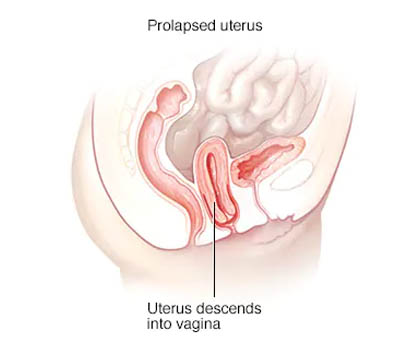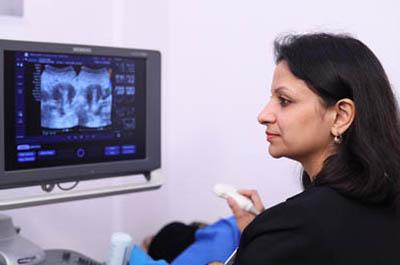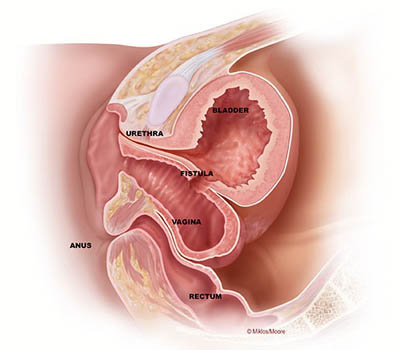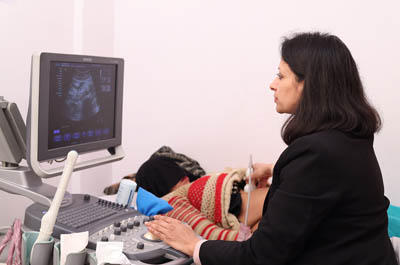
Understanding Uterine Prolapse: Treatment Options and Relief at Precision Gynaecology with Dr. Neha Poddar
Uterine prolapse occurs when the muscles and tissues that support your uterus weaken, causing the uterus to drop down into the vagina or oven outside. This can lead to a variety of uncomfortable symptoms and can affect your quality of life.
At Precision Gynaecology, Dr. Neha Poddar is a trusted partner in women's health and offers expert diagnosis, treatment options, and relief for women with uterine prolapse.
What is Uterine Prolapse?
-
The uterus is normally held in place by strong muscles and connective tissues in the pelvis.
-
When these tissues weaken, the uterus can descend into the vagina.
-
There are different degrees of uterine prolapse, ranging from a slight descent to a complete prolapse where the cervix (or even the entire uterus) protrudes from the vagina.
Causes and Risk Factors:
Several factors can contribute to a weakened pelvic floor, increasing your risk of uterine prolapse, such as:
-
Childbirth: Vaginal delivery, especially multiple births or deliveries with large babies, can weaken the pelvic floor muscles.
-
Age: As you age, the muscles and tissues supporting the uterus naturally weaken.
-
Obesity: Excess weight puts extra strain on the pelvic floor muscles.
-
Chronic cough or straining: Activities that increase pressure in the abdomen, such as chronic coughing or heavy lifting, can weaken the pelvic floor.
-
Chronic constipation

Symptoms of Uterine Prolapse:
Many women with mild uterine prolapse experience no symptoms or only mild discomfort. However, as the prolapse worsens, symptoms can include:
-
A feeling of heaviness or pressure in the pelvis
-
Bulging or sensation of something coming out of the vagina
-
Back pain or lower abdominal pain
-
Difficulty urinating or incomplete emptying of the bladder
-
Urinary incontinence (leakage of urine)
-
Difficulty having intercourse (in some cases)
Diagnosis:
Dr. Poddar can diagnose uterine prolapse through a pelvic exam and may recommend additional tests such as:
-
Ultrasound scan
-
Urodynamic testing (to assess bladder function)
Treatment Options:
The best treatment for uterine prolapse depends on the severity of your symptoms and your overall health. Dr. Poddar offers a personalized approach to treatment, which may include:
-
Pelvic floor muscle exercises (Kegels): Strengthening the pelvic floor muscles can help support the uterus and improve symptoms.
-
Pessary: A pessary is a silicone ring or insert that fits inside the vagina to help hold the uterus in place.
-
Laser Vaginal Therapy: In mild to moderated degrees of prolapse
-
Minimally invasive surgical procedures: These procedures use special techniques to repair or tighten the supporting tissues of the uterus and vagina.
-
Surgery: In severe cases, surgery may be recommended to reposition the uterus or remove the uterus altogether.


Finding Relief and Next Steps:
Uterine prolapse can be a source of discomfort and worry. At Precision Gynaecology, Dr. Poddar understands your concerns and is dedicated to providing relief. She will discuss all your treatment options and help you choose the approach that best suits your individual needs and goals.
Remember, you're not alone. Many women experience uterine prolapse. If you're concerned about symptoms or have been diagnosed with a prolapse, schedule an appointment with Dr. Neha Poddar at Precision Gynaecology. Together, you can develop a personalized treatment plan to find relief and improve your quality of life.
FAQS
Uterine prolapse occurs when the uterus descends from its normal position in the pelvis and protrudes into the vaginal canal or beyond the vaginal opening. This condition can result from weakened pelvic floor muscles and ligaments, typically due to factors such as childbirth, aging, obesity, or repeated heavy lifting. Uterine prolapse can cause symptoms such as pelvic pressure or discomfort, urinary incontinence, difficulty emptying the bladder or bowels, and a sensation of something bulging into the vagina. Dr. Neha Poddar at Precision Gynaecology specializes in diagnosing and managing uterine prolapse to improve pelvic health and quality of life.
Uterine prolapse is commonly caused by factors that weaken or stretch the pelvic floor muscles and ligaments that support the uterus. These factors may include multiple vaginal childbirths, aging and hormonal changes, obesity, chronic coughing or constipation, and conditions that increase abdominal pressure such as heavy lifting or straining. Certain genetic factors or anatomical variations may also predispose some women to uterine prolapse. Dr. Neha Poddar can conduct thorough evaluations to diagnose uterine prolapse and discuss appropriate treatment options at Precision Gynaecology.
Symptoms of uterine prolapse may vary depending on the severity of the condition and may include pelvic pressure or heaviness, a sensation of something bulging into the vagina, urinary symptoms such as urinary incontinence, frequent urination, or urinary retention, bowel symptoms such as constipation or difficulty emptying the bowels, and sexual dysfunction or discomfort. Some women with uterine prolapse may also experience lower back pain or vaginal bleeding. If you suspect you may have uterine prolapse or are experiencing symptoms, it's important to consult with Dr. Neha Poddar for evaluation and management at Precision Gynaecology.
Treatment for uterine prolapse depends on various factors such as the severity of symptoms, the extent of prolapse, and the woman's overall health and reproductive goals. Dr. Neha Poddar may recommend conservative treatments such as pelvic floor exercises (Kegels), lifestyle modifications, or laser Vaginal therapy pessary devices to support the uterus and relieve symptoms. In some cases, surgical interventions such as vaginal or laparoscopic prolapse repair may be necessary to restore the normal position of the uterus and pelvic organs. At Precision Gynaecology, Dr. Poddar provides personalized treatment plans tailored to each patient's needs and goals.

Vesico - vaginal fistula: Understanding, Symptoms, Causes, Diagnosis, and Treatment at Precision Gynaecology with Dr. Neha Poddar
Welcome to Precision Gynaecology by Dr. Neha. Our hospital is committed to offering comprehensive care for complex gynecological conditions, including Vesico-Vaginal Fistula (VVF). This guide provides detailed information about VVF, from understanding the condition to its symptoms, causes, diagnosis, treatment options, and the importance of early intervention.
Understanding Vesico - vaginal fistula:
A Vesico-Vaginal Fistula (VVF) is an abnormal connection between the bladder and the vagina. This condition leads to the continuous and involuntary discharge of urine into the vaginal vault. VVF can result from surgical complications, childbirth injuries, or other medical conditions, significantly affecting a woman's quality of life and emotional well-being.
Symptoms of Vesico - vaginal fistula:
The primary symptom of VVF is the constant leakage of urine from the vagina. Other symptoms may include:
-
Recurrent urinary tract infections
-
Foul-smelling vaginal discharge
-
Irritation or pain in the vaginal area
-
Inflammation and infection of the vaginal tissues
-
Emotional distress and social isolation due to urinary incontinence

Causes:
VVF can be caused by various factors, including:
-
Prolonged and obstructed labor during childbirth
-
Surgical procedures, particularly hysterectomies or other pelvic surgeries
-
Radiation therapy for pelvic cancers
-
Trauma or injury to the pelvic region
-
Infections that affect the urinary tract and surrounding tissues
Diagnosis:
Accurate diagnosis of VVF is essential for effective treatment. Dr. Neha utilizes a combination of medical history, physical examinations, and diagnostic tests to confirm the presence and extent of the fistula. Diagnostic methods include:
-
Pelvic examination
-
Dye tests to visualize the leakage
-
Cystoscopy to examine the inside of the bladder and urethra
-
Imaging studies such as ultrasound, MRI, or CT scans
Treatment Options:
The treatment of VVF typically involves surgical intervention to repair the fistula. The specific approach depends on the size and location of the fistula, as well as the patient's overall health. Treatment options include:
-
Conservative management with catheterization for small fistulas or those identified early
-
Surgical repair, which may involve vaginal or abdominal approaches
-
Use of tissue grafts or flaps to aid in the closure of the fistula
-
Postoperative care, including antibiotics to prevent infection and close monitoring to ensure proper healing
Importance of Early Diagnosis and Treatment:
Early diagnosis and treatment of VVF are crucial to prevent complications and improve the patient's quality of life. Delayed treatment can lead to chronic infections, severe discomfort, and emotional distress. Prompt surgical repair can restore normal urinary function and significantly enhance the patient's physical and emotional well-being.


Support and Next Steps:
At Precision Gynaecology, we understand the profound impact that VVF can have on a woman's life. Dr. Neha and her dedicated team are here to provide compassionate care and expert guidance throughout your treatment journey. If you suspect you have VVF or are experiencing symptoms, we encourage you to schedule a consultation. Together, we can develop a personalized treatment plan to help you achieve optimal health and regain your quality of life.
FAQS
A vesico-vaginal fistula (VVF) is an abnormal connection between the bladder and the vagina, which can result in continuous urinary leakage. Dr. Neha Poddar at Precision Gynaecology specializes in diagnosing and treating this condition to restore normal urinary function and improve quality of life.
The primary symptom of a vesico-vaginal fistula is involuntary leakage of urine from the vagina. Other symptoms may include recurrent urinary tract infections, vaginal irritation, and unpleasant odor. Dr. Neha Poddar can conduct thorough evaluations to confirm the diagnosis and recommend appropriate treatment options.
Diagnosis typically involves a combination of medical history review, physical examination, and specialized tests such as dye tests, cystoscopy, or imaging studies. At Precision Gynaecology, Dr. Neha Poddar utilizes advanced diagnostic tools to accurately identify and assess the extent of the fistula.
Treatment usually involves surgical repair of the fistula. Dr. Neha Poddar offers various surgical techniques, including minimally invasive options, to effectively close the fistula and restore normal function. Postoperative care and follow-up are crucial to ensure successful recovery and prevent recurrence.
- General Gynae
- Menstrual Disorders
- Vaginal discharge
- Cervical Cancer - Screening & Vaccination
- Pelvic inflammatory disease (PID)
- Infertility treatment (IVF & IUI)
- Uterine polyps
- Septate Uterus (Uterine Septum)
- Uterine Fibroids
- Ovarian Cysts
- Dermoid Cysts
- Ectopic Pregnancy
- Endometriosis
- Menopause
- Hormonal Disorders
- PCOS and Hyperprolactinemia
- Gynae Endoscopy
- Uro Gynae
Are you seeking a qualified and experienced gynecologist and obstetrician in Ghaziabad? Look no further than Dr. Neha Poddar!
- Call 9318413696, 9958170476
- Whatsapp 9318413696

Doctors
-

Dr. Madhu Poddar
-

Dr. R.K. Poddar
-

Dr. Neha Poddar
-

Dr. Rahul Poddar